Edu van der Werf
@eduvanderwerf.bsky.social
Father of two. Trying to understand life in general and trust in particular.
Member of First International Network on Trust (FINT). Initiator of TrustXNetwork
Member of First International Network on Trust (FINT). Initiator of TrustXNetwork
Reposted by Edu van der Werf
New paper out on trust in science in the International Journal of Public Opinion Research.
🙏 to @nielsmede.bsky.social and @colognaviktoria.bsky.social for initiating the TISP project and to @juliametag.bsky.social for her helpful input throughout the project. Free-access link: shorturl.at/4VBAJ
🙏 to @nielsmede.bsky.social and @colognaviktoria.bsky.social for initiating the TISP project and to @juliametag.bsky.social for her helpful input throughout the project. Free-access link: shorturl.at/4VBAJ
October 15, 2025 at 8:42 AM
New paper out on trust in science in the International Journal of Public Opinion Research.
🙏 to @nielsmede.bsky.social and @colognaviktoria.bsky.social for initiating the TISP project and to @juliametag.bsky.social for her helpful input throughout the project. Free-access link: shorturl.at/4VBAJ
🙏 to @nielsmede.bsky.social and @colognaviktoria.bsky.social for initiating the TISP project and to @juliametag.bsky.social for her helpful input throughout the project. Free-access link: shorturl.at/4VBAJ
Reposted by Edu van der Werf
Social media undercuts public health and institutional trust
A new study finds causal evidence that morally charged attacks generate anger and social media engagement which exacerbates the political polarization of public health
www.pnas.org/doi/epdf/10....
A new study finds causal evidence that morally charged attacks generate anger and social media engagement which exacerbates the political polarization of public health
www.pnas.org/doi/epdf/10....

September 9, 2025 at 3:13 PM
Social media undercuts public health and institutional trust
A new study finds causal evidence that morally charged attacks generate anger and social media engagement which exacerbates the political polarization of public health
www.pnas.org/doi/epdf/10....
A new study finds causal evidence that morally charged attacks generate anger and social media engagement which exacerbates the political polarization of public health
www.pnas.org/doi/epdf/10....
Reposted by Edu van der Werf
ANSWER: 0 (yes, ZERO!)
This is a result of an analysis done by a student in my grad seminar, using a large dataset (N=307,313).
What this result might mean: Nobody's personality is truly "average," and people's personality profiles (at least Big 5) might be more "jagged" than we think.
(🧵 1/5)
This is a result of an analysis done by a student in my grad seminar, using a large dataset (N=307,313).
What this result might mean: Nobody's personality is truly "average," and people's personality profiles (at least Big 5) might be more "jagged" than we think.
(🧵 1/5)
Imagine you have Big 5 personality scores from over 300,000 people. You designate the scores in the "mean +/- 0.25 SDs" range for each trait (~20%) as the average range.
QUESTION: How many people in this >300K sample do you think fall in the average range for ALL 5 TRAITS?
What's your answer?
QUESTION: How many people in this >300K sample do you think fall in the average range for ALL 5 TRAITS?
What's your answer?

September 7, 2025 at 3:03 PM
ANSWER: 0 (yes, ZERO!)
This is a result of an analysis done by a student in my grad seminar, using a large dataset (N=307,313).
What this result might mean: Nobody's personality is truly "average," and people's personality profiles (at least Big 5) might be more "jagged" than we think.
(🧵 1/5)
This is a result of an analysis done by a student in my grad seminar, using a large dataset (N=307,313).
What this result might mean: Nobody's personality is truly "average," and people's personality profiles (at least Big 5) might be more "jagged" than we think.
(🧵 1/5)
Reposted by Edu van der Werf
Peilingen zijn nuttige instrumenten voor kiezers, politici, en media. Ze kunnen wezenlijke effecten hebben, vooral via de wijze waarop media er - juist én onjuist - over rapporteren.
Ook in de campagneperiode hoop ik dat journalisten en duiders de peilingen gebruiken waarvoor ze geschikt zijn:
Ook in de campagneperiode hoop ik dat journalisten en duiders de peilingen gebruiken waarvoor ze geschikt zijn:
September 5, 2025 at 4:54 PM
Peilingen zijn nuttige instrumenten voor kiezers, politici, en media. Ze kunnen wezenlijke effecten hebben, vooral via de wijze waarop media er - juist én onjuist - over rapporteren.
Ook in de campagneperiode hoop ik dat journalisten en duiders de peilingen gebruiken waarvoor ze geschikt zijn:
Ook in de campagneperiode hoop ik dat journalisten en duiders de peilingen gebruiken waarvoor ze geschikt zijn:
Reposted by Edu van der Werf
When people hear others’ views on politically sensitive topics (e.g., migration, abortion), they quickly become disrespectful or disengage. How can we express our views in such a way that they foster respect and interaction?
@emilykubin.bsky.social, @kurtjgray.bsky.social & I studied this.
🧵1/7
@emilykubin.bsky.social, @kurtjgray.bsky.social & I studied this.
🧵1/7
August 26, 2025 at 8:10 AM
When people hear others’ views on politically sensitive topics (e.g., migration, abortion), they quickly become disrespectful or disengage. How can we express our views in such a way that they foster respect and interaction?
@emilykubin.bsky.social, @kurtjgray.bsky.social & I studied this.
🧵1/7
@emilykubin.bsky.social, @kurtjgray.bsky.social & I studied this.
🧵1/7
Reposted by Edu van der Werf
A new study found that popularity matters more than self-esteem or title for cultivating authenticity at work. f-st.co/s5P9Lw6

It's easier to be yourself at work when you're popular
A new study found that popularity matters more than self-esteem or title for cultivating authenticity at work.
f-st.co
August 23, 2025 at 6:27 AM
A new study found that popularity matters more than self-esteem or title for cultivating authenticity at work. f-st.co/s5P9Lw6
Reposted by Edu van der Werf
Excited to head to Thessaloniki ☀️ soon for #ecprgc25 to present our paper on political trust and policy support. Looking forward to engaging discussions and to soak up some of the city's historic charm between sessions. If you're working on a related topic, do get in touch – I'd love to connect!

August 21, 2025 at 10:51 AM
Excited to head to Thessaloniki ☀️ soon for #ecprgc25 to present our paper on political trust and policy support. Looking forward to engaging discussions and to soak up some of the city's historic charm between sessions. If you're working on a related topic, do get in touch – I'd love to connect!
Reposted by Edu van der Werf
New preprint🔊🧓: Why do we trust our friends more? We show that people are more efficient at evaluating information when making trust decisions about friends. This is preserved across the adult life span. W/ @jjfcastrellon.bsky.social . Feedback welcome: osf.io/tkpmv_v1

August 15, 2025 at 9:13 PM
New preprint🔊🧓: Why do we trust our friends more? We show that people are more efficient at evaluating information when making trust decisions about friends. This is preserved across the adult life span. W/ @jjfcastrellon.bsky.social . Feedback welcome: osf.io/tkpmv_v1
Reposted by Edu van der Werf
Whom do we want to see in power? People high in both benevolence and integrity - that's what a new paper by Annika Scholl, H Rapp, Gerben van Kleef and myself shows. 4 Studies (N=1151) provide consistent evidence for this interaction effect. Delighted to see this work out doi.org/10.1037/xap0...
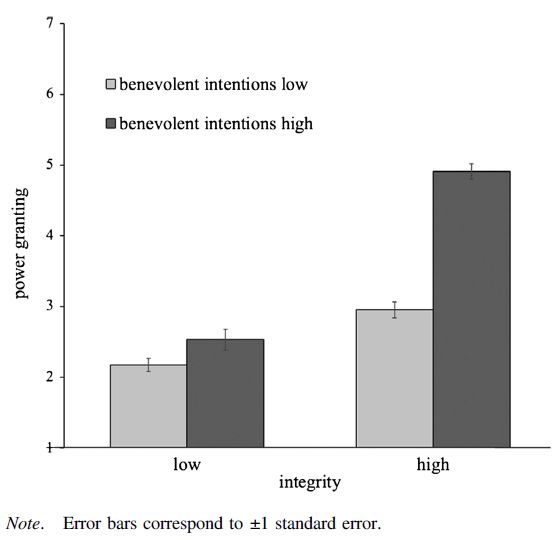
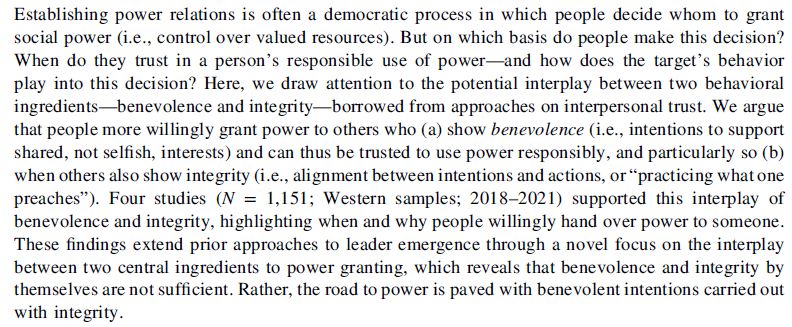
June 6, 2025 at 5:17 AM
Whom do we want to see in power? People high in both benevolence and integrity - that's what a new paper by Annika Scholl, H Rapp, Gerben van Kleef and myself shows. 4 Studies (N=1151) provide consistent evidence for this interaction effect. Delighted to see this work out doi.org/10.1037/xap0...
Reposted by Edu van der Werf
🚨 New study reveals that when used to summarize scientific research, generative AI is nearly five times less accurate than humans.
Many haven't realized, but Gen AI's accuracy problem is worse than initially thought.
Many haven't realized, but Gen AI's accuracy problem is worse than initially thought.
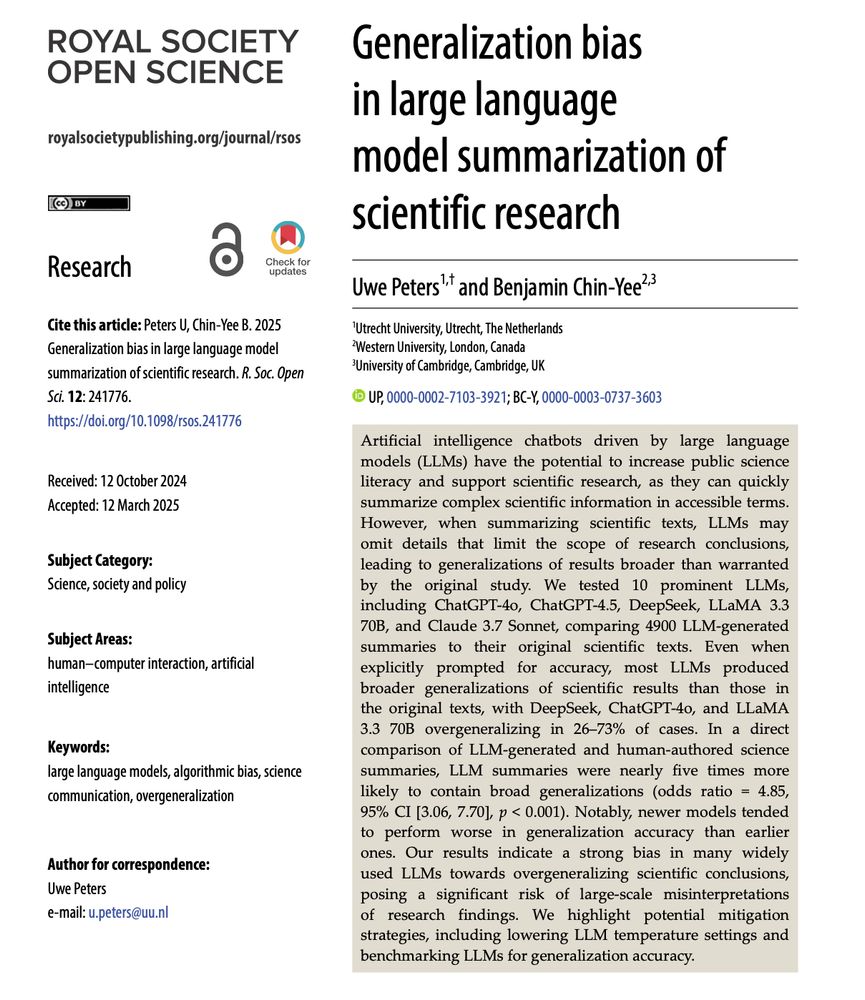
May 19, 2025 at 3:54 PM
🚨 New study reveals that when used to summarize scientific research, generative AI is nearly five times less accurate than humans.
Many haven't realized, but Gen AI's accuracy problem is worse than initially thought.
Many haven't realized, but Gen AI's accuracy problem is worse than initially thought.
Reposted by Edu van der Werf
Since 1954, "The Handbook of Social Psychology" has been the field’s most authoritative reference work, and today is the launch of the 6th edition. Best news? The HSP is now open-access—free to read, download, and share.
the-hsp.com
the-hsp.com
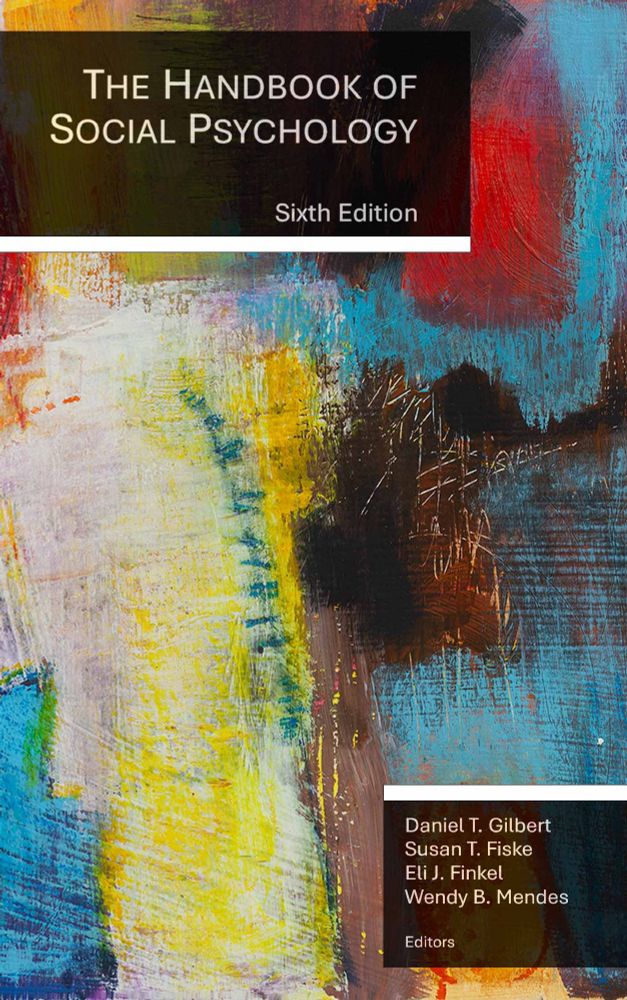
May 19, 2025 at 5:02 PM
Since 1954, "The Handbook of Social Psychology" has been the field’s most authoritative reference work, and today is the launch of the 6th edition. Best news? The HSP is now open-access—free to read, download, and share.
the-hsp.com
the-hsp.com
Reposted by Edu van der Werf
Interested in how public services affect political distrust, populist support, and similar? Longitudinal evidence from Germany and Norway.
doi.org/10.1080/1471...
doi.org/10.1080/1471...
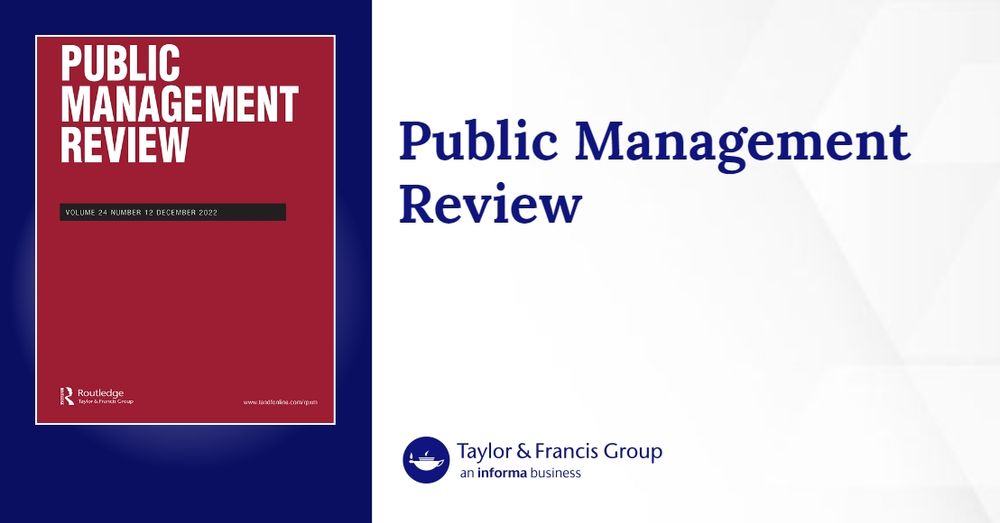
Welfare state evaluations, normative expectations, and political trust: longitudinal evidence from Germany and Norway
The expectancy-disconfirmation model (EDM) explains satisfaction with public services as a combination of service expectations and perceived performance. We study how satisfaction in turn affects p...
doi.org
May 5, 2025 at 3:18 PM
Interested in how public services affect political distrust, populist support, and similar? Longitudinal evidence from Germany and Norway.
doi.org/10.1080/1471...
doi.org/10.1080/1471...
Reposted by Edu van der Werf
When misinformation – about vaccines, fluoride, supplements, climate change, etc – linked to political identity = more difficult to change minds.
Trust too.
Study: "....liberals (compared with conservatives) show higher trust in most scientists."
No interventions > trust was successful. Ugh.
Trust too.
Study: "....liberals (compared with conservatives) show higher trust in most scientists."
No interventions > trust was successful. Ugh.

May 1, 2025 at 2:28 PM
When misinformation – about vaccines, fluoride, supplements, climate change, etc – linked to political identity = more difficult to change minds.
Trust too.
Study: "....liberals (compared with conservatives) show higher trust in most scientists."
No interventions > trust was successful. Ugh.
Trust too.
Study: "....liberals (compared with conservatives) show higher trust in most scientists."
No interventions > trust was successful. Ugh.
Reposted by Edu van der Werf
I did a podcast on trust in Chinese foreign policy with Severin de Wit's excellent TrustTalk podcast.
It's available:
✔️ on the TrustTalk website: lnkd.in/e-qrc9n3
✔️ On Apple Podcasts: lnkd.in/eDHkw8tz
✔️ On Spotify: lnkd.in/eTRNsiCz
✔️ On the TrustTalk YouTube channel: lnkd.in/e-i-e9fr
It's available:
✔️ on the TrustTalk website: lnkd.in/e-qrc9n3
✔️ On Apple Podcasts: lnkd.in/eDHkw8tz
✔️ On Spotify: lnkd.in/eTRNsiCz
✔️ On the TrustTalk YouTube channel: lnkd.in/e-i-e9fr
April 17, 2025 at 12:31 PM
I did a podcast on trust in Chinese foreign policy with Severin de Wit's excellent TrustTalk podcast.
It's available:
✔️ on the TrustTalk website: lnkd.in/e-qrc9n3
✔️ On Apple Podcasts: lnkd.in/eDHkw8tz
✔️ On Spotify: lnkd.in/eTRNsiCz
✔️ On the TrustTalk YouTube channel: lnkd.in/e-i-e9fr
It's available:
✔️ on the TrustTalk website: lnkd.in/e-qrc9n3
✔️ On Apple Podcasts: lnkd.in/eDHkw8tz
✔️ On Spotify: lnkd.in/eTRNsiCz
✔️ On the TrustTalk YouTube channel: lnkd.in/e-i-e9fr
The motivational aspect of trust is a really interesting topic! Check out this article in Journal of Trust Research.
🤝 Who's motivated to #trust? In our latest publication in @joftrustres.bsky.social, we investigate the role of promotion and prevention (regulatory focus) as separate motivations influencing social trust
🔗 #openaccess paper: www.tandfonline.com/doi/full/10....
#trustresearch #PsychSciSky #SocialPsyc
🔗 #openaccess paper: www.tandfonline.com/doi/full/10....
#trustresearch #PsychSciSky #SocialPsyc

April 14, 2025 at 8:09 AM
The motivational aspect of trust is a really interesting topic! Check out this article in Journal of Trust Research.
Reposted by Edu van der Werf
I am really proud about this publication on trust, with Chaïm la Roi and @cvalebeek.bsky.social .
Using unique panel data, we show (1) that trust has a dispositional element among adults, and (2) that these trust attitudes are socialized during adolescence.
link.springer.com/article/10.1...
Using unique panel data, we show (1) that trust has a dispositional element among adults, and (2) that these trust attitudes are socialized during adolescence.
link.springer.com/article/10.1...
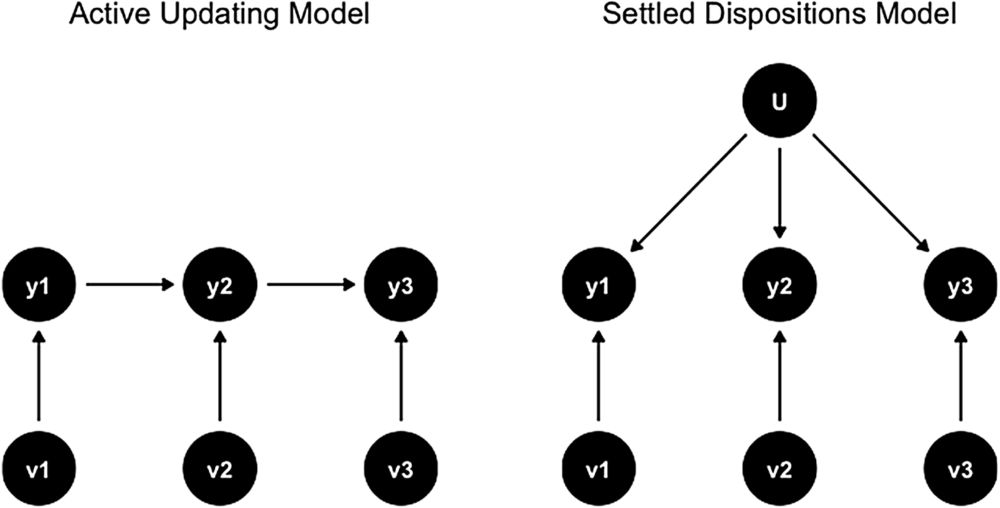
Socialized to (Dis)trust? A Panel Study into the Origins of Dispositional Institutional Trust - Social Indicators Research
A longstanding argument in the field of institutional trust reads that trust is the outcome of a process of socialization. This approach suggests that institutional trust may be understood as a set di...
link.springer.com
April 10, 2025 at 11:32 AM
I am really proud about this publication on trust, with Chaïm la Roi and @cvalebeek.bsky.social .
Using unique panel data, we show (1) that trust has a dispositional element among adults, and (2) that these trust attitudes are socialized during adolescence.
link.springer.com/article/10.1...
Using unique panel data, we show (1) that trust has a dispositional element among adults, and (2) that these trust attitudes are socialized during adolescence.
link.springer.com/article/10.1...
Reposted by Edu van der Werf
How does #Disinformation affect public trust in science? Can healthy scepticism be good? A debate with Sonia Seneviratne, Mike S. Schäfer and former Swiss Chancellor Walter Thurnherr. Welcome to our first contribution of our focus week on trust.
Article: ethz.ch/en/news-and-...
Article: ethz.ch/en/news-and-...
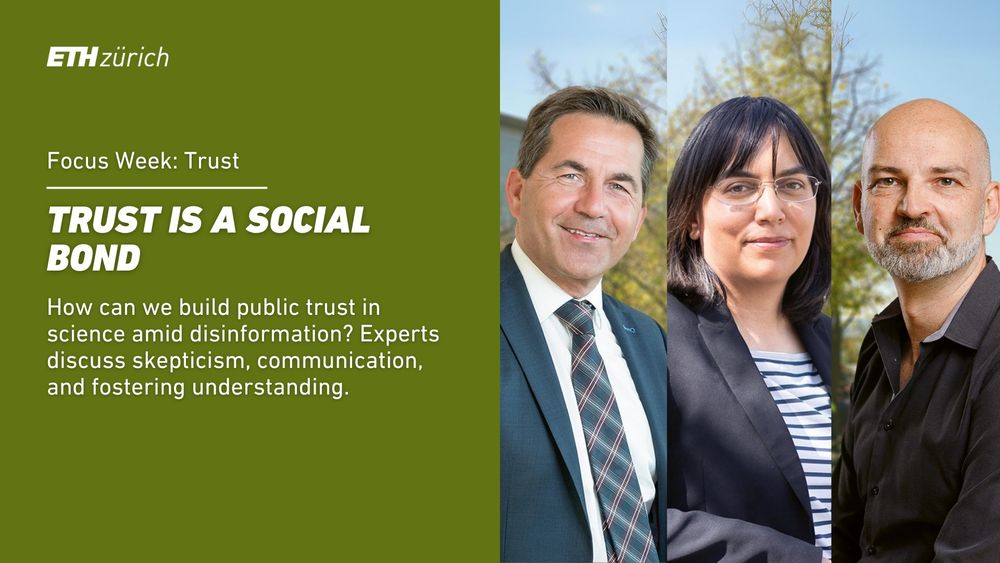
March 31, 2025 at 8:21 AM
How does #Disinformation affect public trust in science? Can healthy scepticism be good? A debate with Sonia Seneviratne, Mike S. Schäfer and former Swiss Chancellor Walter Thurnherr. Welcome to our first contribution of our focus week on trust.
Article: ethz.ch/en/news-and-...
Article: ethz.ch/en/news-and-...
Reposted by Edu van der Werf
Another excellent trust workshop, this time organised by @tomwgvdmeer.bsky.social and Carmen van Alebeek in Amsterdam. And the soft launch of the Political Trust Network!

March 14, 2025 at 3:07 PM
Another excellent trust workshop, this time organised by @tomwgvdmeer.bsky.social and Carmen van Alebeek in Amsterdam. And the soft launch of the Political Trust Network!
Reposted by Edu van der Werf
Excited to share that my paper on citizen-to-citizen persuasion, co-authored with Carlos Rueda-Cañòn and @tjryan02.bsky.social, was just accepted at the Journal of Politics @thejop.bsky.social . Link: www.journals.uchicago.edu/doi/10.1086/... 🧵
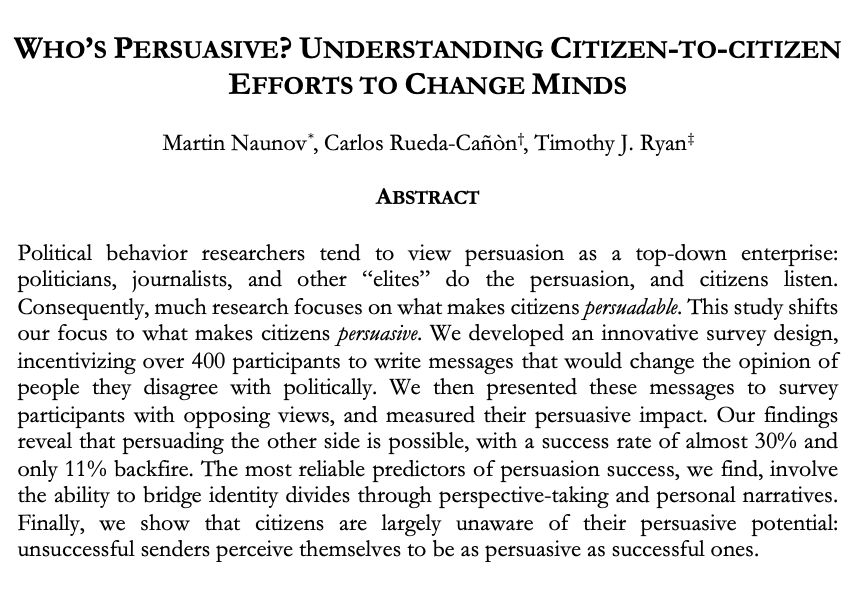
March 5, 2025 at 4:52 PM
Excited to share that my paper on citizen-to-citizen persuasion, co-authored with Carlos Rueda-Cañòn and @tjryan02.bsky.social, was just accepted at the Journal of Politics @thejop.bsky.social . Link: www.journals.uchicago.edu/doi/10.1086/... 🧵
Reposted by Edu van der Werf
Professionals are often frightened of dissociation—they keep it at arm’s length or deny it altogether. But for us as trauma survivors, this isn’t a luxury we have.
Dissociation isn’t rare. Dissociation is near ubiquitous.
Dissociation isn’t rare. Dissociation is near ubiquitous.

February 21, 2025 at 10:53 AM
Professionals are often frightened of dissociation—they keep it at arm’s length or deny it altogether. But for us as trauma survivors, this isn’t a luxury we have.
Dissociation isn’t rare. Dissociation is near ubiquitous.
Dissociation isn’t rare. Dissociation is near ubiquitous.
Reposted by Edu van der Werf
OnlineFirst publication:
Schwade, Sophie Altenmüller, & @mariogollwitzer.bsky.social explore how the use of informal communication impacts the degree of trustworthiness and closeness in professional and private relationship dynamics.
doi.org/10.1177/0265...
#AcasemicSky #SocialPsychology
Schwade, Sophie Altenmüller, & @mariogollwitzer.bsky.social explore how the use of informal communication impacts the degree of trustworthiness and closeness in professional and private relationship dynamics.
doi.org/10.1177/0265...
#AcasemicSky #SocialPsychology
Sage Journals: Discover world-class research
Subscription and open access journals from Sage, the world's leading independent academic publisher.
doi.org
January 27, 2025 at 1:13 PM
OnlineFirst publication:
Schwade, Sophie Altenmüller, & @mariogollwitzer.bsky.social explore how the use of informal communication impacts the degree of trustworthiness and closeness in professional and private relationship dynamics.
doi.org/10.1177/0265...
#AcasemicSky #SocialPsychology
Schwade, Sophie Altenmüller, & @mariogollwitzer.bsky.social explore how the use of informal communication impacts the degree of trustworthiness and closeness in professional and private relationship dynamics.
doi.org/10.1177/0265...
#AcasemicSky #SocialPsychology
Volg een tijdje zowel wetenschappers als @hardgras.bsky.social #Hardgraspodcast en dit verschijnt als vanzelf in je tijdlijn :)
Emotions matter in procrastination. A leading theory (by Sirois) views it as a coping strategy to deal w/ negative moods (the figure is from our paper, rdcu.be/dPMCV):
task aversion➡️negative mood (dread, stress)➡️a need for mood repair➡️"giving in" to short-term pleasure
Does this ring a bell?
task aversion➡️negative mood (dread, stress)➡️a need for mood repair➡️"giving in" to short-term pleasure
Does this ring a bell?
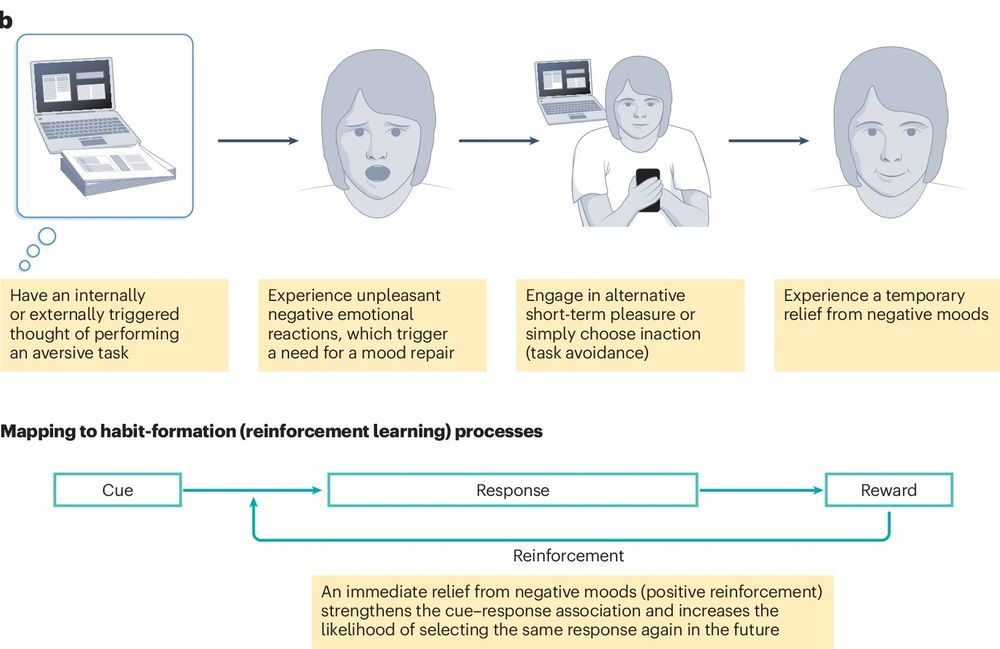
January 15, 2025 at 7:48 PM
Volg een tijdje zowel wetenschappers als @hardgras.bsky.social #Hardgraspodcast en dit verschijnt als vanzelf in je tijdlijn :)
Reposted by Edu van der Werf
Changing our behaviour isn't easy–and changing the behaviour of others is even harder.
Here is a great analysis of 19 behavioural principles we proposed that are rooted in decades of research.
What works and what doesn't when it comes to changing behavior: www.bps.org.uk/psychologist...
Here is a great analysis of 19 behavioural principles we proposed that are rooted in decades of research.
What works and what doesn't when it comes to changing behavior: www.bps.org.uk/psychologist...

January 5, 2025 at 5:57 PM
Changing our behaviour isn't easy–and changing the behaviour of others is even harder.
Here is a great analysis of 19 behavioural principles we proposed that are rooted in decades of research.
What works and what doesn't when it comes to changing behavior: www.bps.org.uk/psychologist...
Here is a great analysis of 19 behavioural principles we proposed that are rooted in decades of research.
What works and what doesn't when it comes to changing behavior: www.bps.org.uk/psychologist...
Reposted by Edu van der Werf
Trust in Social Interaction: From Dyads to Civilizations
pubmed.ncbi.nlm.nih.gov/37988501/
pubmed.ncbi.nlm.nih.gov/37988501/

Trust in Social Interaction: From Dyads to Civilizations - PubMed
Human trust can be construed as a heuristic wager on the predictability and benevolence of others, within a compatible worldview. A leap of faith across gaps in information. Generally, we posit that t...
pubmed.ncbi.nlm.nih.gov
December 23, 2024 at 9:15 PM
Trust in Social Interaction: From Dyads to Civilizations
pubmed.ncbi.nlm.nih.gov/37988501/
pubmed.ncbi.nlm.nih.gov/37988501/

